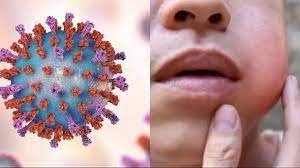On March 10, 2024 Kerala witnessed 190 cases of mumps in a single day. According to a report, over 11,000 cases of mumps was recorded in January 2024. The officials from The Union Health Ministry confirmed that The National Centre for Disease Control has been informed. More than 2,500 cases were reported last month. Children from various other states like Andhra Pradesh, Maharashtra and Telangana have also been affected in the last few months raising concerns for the parents.
Mumps is a viral infection that mostly affects children and young adults. It is a member of the Rubulavirus family, and is caused by Paramyxovirus. It mostly occurs in slavery glands which causes swelling and tenderness near the jawline. According to the WHO mumps virus exclusively targets humans, transmitted through direct contact or airborne droplets expelled from the respiratory tract of infected individuals.
Symptoms of Mumps
1. Swelling of Salivary Glands: One of the hallmark symptoms of mumps is the swelling of one or more of the salivary glands, typically the parotid glands located just below the ears. This swelling can cause pain and tenderness in the affected area.
2. Fever: Mumps is often accompanied by a fever, which can range from mild to high-grade, depending on the individual’s immune response to the virus.
3. Headache: Many individuals with mumps experience headaches, which can vary in intensity and duration.
4. Muscle Aches: Generalized muscle aches and fatigue are common symptoms of mumps and can contribute to feelings of malaise and discomfort.
5. Loss of Appetite: Some people with mumps may experience a loss of appetite, which can lead to dehydration if not addressed promptly.
6. Painful Swallowing: Swelling of the salivary glands can make swallowing painful, particularly when consuming acidic or sour foods.
7. Fatigue: Mumps can cause significant fatigue, leaving individuals feeling weak and lethargic.
Prevention from Mumps
1. Vaccination: The most effective way to prevent mumps is through vaccination. The MMR (measles, mumps, and rubella) vaccine provides immunity against mumps and is typically administered in two doses, the first at 12 to 15 months of age and the second at 4 to 6 years of age.
2. Maintaining Hygiene: Practicing good hygiene, such as regular handwashing with soap and water, can help reduce the risk of mumps transmission. Avoiding close contact with infected individuals and covering the mouth and nose when coughing or sneezing also play a crucial role in prevention.
3. Isolation of Infected Individuals: Individuals diagnosed with mumps should isolate themselves from others, especially in crowded settings like schools or daycare centers, to prevent further spread of the virus.
4. Post-Exposure Prophylaxis: People who have been in close contact with someone diagnosed with mumps may receive the MMR vaccine or immune globulin to prevent infection or lessen its severity.
By staying informed about preventive measures and recognizing the symptoms of mumps, individuals can take proactive steps to protect themselves and their communities from this contagious viral infection. Vigilance, vaccination, and prompt medical attention are key in controlling the spread of mumps and safeguarding public health.






